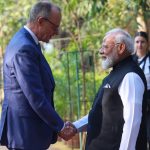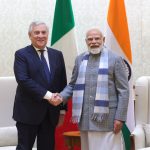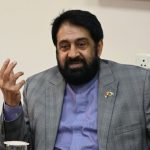 As the SCO’s annual show unfolds in Kyrgyz capital Bishkek, India has renewed its pitch for full membership of the six-nation Shanghai Cooperation Organisation and underlined that this Central Asia body can play a crucial role in stabilising the violence-prone Afghanistan.
As the SCO’s annual show unfolds in Kyrgyz capital Bishkek, India has renewed its pitch for full membership of the six-nation Shanghai Cooperation Organisation and underlined that this Central Asia body can play a crucial role in stabilising the violence-prone Afghanistan.
More than a decade after it was founded to promote regional security and economic integration in the resource-rich Central Asian region, the SCO has emerged as an influential platform in enhancing counter-terror cooperation and in setting the agenda on key regional issues.
The SCO has been traditionally dominated by the Big 2 of the region, Russia and China, but with the growing importance of the body, observers like India, Pakistan and Iran have been keen to upgrade their role in the grouping as full members.
Bigger role for India
This time round, External Affairs Minister Salman Khurshid is representing India at the 13th SCO summit. “India stands ready to play a larger role in the SCO as a full member, once the organization reaches consensus on the expansion process,” Khurshid told leaders and representatives of the SCO member and observer countries in Bishkek September 13. Pitching for expansion of the SCO, the minister argued that “an expanded SCO will be a more effective body to address the numerous security and developmental challenges that our region faces.”
The SCO comprises Russia and China, the two regional giants and permanent members of the UN Security Council, and the energy-rich Central Asian states, including Kazakhstan, Uzbekistan, Tajikistan and Kyrgyzstan.
India, along with Iran, Pakistan and Mongolia, currently enjoys the status of observer at the SCO. Any decision on including India or expanding membership is unlikely to be taken at the SCO summit in Bishkek. Although Russia has backed India’s full membership, China is seen to be ambivalent on India’s entry into the grouping as a full-fledged member. The Tashkent SCO Summit in June 2010 lifted the moratorium on new membership, but the SCO has since then been engaged in internal debates about the modalities/formalities for expansion of the organisation. Any final decision will be taken on the basis of consensus. In principle, China has welcomed India’s prospective entry into the grouping, but has stressed that “the relevant countries should work hard towards political, legal and technical preparations for [the membership].” China has not explicitly opposed India joining the SCO, but insiders say that Beijing is looking for a deal with New Delhi whereby it becomes a member of the South Asian Association for Regional Cooperation (SAARC) in return for getting India inside the SCO tent.
Terrorism
Counter-terrorism is a major driver of India’s interest in scaling up its role in the six-nation body as the SCO is specially proactive in creating regional structures for combating the trinity of evils – terrorism, separatism and extremism. India is keen to deepen cooperation with the Tashkent-based Regional Anti-Terrorism Structure (RATS). Salman Khurshid placed India’s counter-terror concerns upfront at the SCO summit: “India has long been a victim of terrorism and we are acutely aware of the threat that its perpetrators pose to our people. We are of the firm view that only multilateral efforts and integrated actions can help effectively counter these negative forces including the related evils of drug trafficking and small arms proliferation.”
Besides counter-terrorism, energy security, enhancing connectivity and rejuvenating economic linkages are important imperatives driving India’s deeper engagement with the SCO and the Central Asian region.
Future of Afghanistan
But more important than anything else, it is the volatile situation in Afghanistan that is spurring India to step up its outreach to upgrade its role from an observer to a full member in the SCO.
 The dangerous mix of Islamist militant networks and narcotics trade in the region that directly impinges on the stability of Afghanistan has aggravated India’s concerns. The recent attack on the Indian consulate in Jalalabad has only sharpened these concerns and has prodded India’s policy-makers to push more vigorously for a regional approach in stabilising Afghanistan. India has pledged over $2 billion in Afghanistan in multifarious reconstruction activities ranging from building roads, bridges and power stations to constructing the building of the Afghan parliament and a host of grassroot projects that are transforming the lives of ordinary Afghans.
The dangerous mix of Islamist militant networks and narcotics trade in the region that directly impinges on the stability of Afghanistan has aggravated India’s concerns. The recent attack on the Indian consulate in Jalalabad has only sharpened these concerns and has prodded India’s policy-makers to push more vigorously for a regional approach in stabilising Afghanistan. India has pledged over $2 billion in Afghanistan in multifarious reconstruction activities ranging from building roads, bridges and power stations to constructing the building of the Afghan parliament and a host of grassroot projects that are transforming the lives of ordinary Afghans.
Like India, the SCO member states have important stakes in peace and stability in Afghanistan. Other observers and dialogue partners like Iran and Pakistan are equally important players in the Afghan equations that are emerging in the run-up to the withdrawal of foreign combat troops from Afghanistan in 2014 and beyond. India has already been engaged with Russia and Iran over the situation in Afghanistan. This year, India launched a dialogue with China, which has investments in oil and mining sectors in that country, over cooperation in Afghanistan. India, therefore, sees the SCO as “as an important body that can offer a credible alternative regional platform to discuss the challenges related to Afghanistan,” as Minister Khurshid stressed.
 Afghanistan has been steadily climbing on top of the SCO agenda in the last two years. At the Beijing summit last year, Kabul, a long-time special invitee, was upgraded to the status of an observer. Afghan President Hamid Karzai has sought more funds from the SCO and exhorted the SCO leaders to be proactively involved in bolstering security and economic reconstruction of his country.
Afghanistan has been steadily climbing on top of the SCO agenda in the last two years. At the Beijing summit last year, Kabul, a long-time special invitee, was upgraded to the status of an observer. Afghan President Hamid Karzai has sought more funds from the SCO and exhorted the SCO leaders to be proactively involved in bolstering security and economic reconstruction of his country.
Given the critical importance of a stable Afghanistan to the country, Kabul could be admitted as a member of the SCO along with India and Pakistan when the SCO expands. The SCO’s greater proactive involvement in Afghanistan could be a game-changer as it provides an alternative regional platform for stabilising Afghanistan after the Nato-led troops leave in 2014.
Author Profile

- Manish Chand is Founder and Editor-in-Chief of India Writes Network (www.indiawrites.org) and India and World, a pioneering magazine focused on international affairs. He is CEO, Centre for Global India Insights, an India-based think tank focused on global affairs.
Latest entries
 India and the WorldJanuary 13, 2026India, Germany raise the bar for defence, economic ties
India and the WorldJanuary 13, 2026India, Germany raise the bar for defence, economic ties India and the WorldDecember 12, 2025India-Italy bonding: Tajani’s visit raises the bar for business, maritime ties
India and the WorldDecember 12, 2025India-Italy bonding: Tajani’s visit raises the bar for business, maritime ties In ConversationNovember 26, 2025G20 is a Force for global Good
In ConversationNovember 26, 2025G20 is a Force for global Good articlesNovember 26, 2025Rescuing G20 from North-South divide: Ubuntu Moment
articlesNovember 26, 2025Rescuing G20 from North-South divide: Ubuntu Moment







